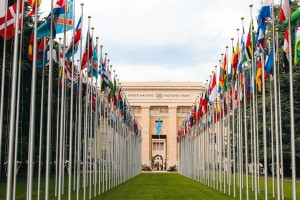Are you a business owner looking to expand your reach beyond local markets? In today's interconnected world, mastering the art of international marketing is crucial for businesses that want to grow and succeed on a global scale. In this article, we will explore the key strategies and best practices for taking your business from local to global. Whether you are just starting out or already have a presence in international markets, this guide will provide you with valuable insights to optimize your international marketing efforts and drive success.
Expanding your business beyond local borders can be a rewarding yet challenging endeavor. It requires a strategic approach and a deep understanding of the international markets you wish to target. In this article, we will guide you through the process of mastering international marketing, enabling you to navigate the complexities and seize global opportunities.
Understanding International Markets
Before venturing into international marketing, it is essential to gain a comprehensive understanding of the markets you intend to enter. Conduct thorough market research to identify consumer behavior, competition, cultural nuances, and legal requirements. This information will help you tailor your marketing strategies and messages effectively.
Conducting Market Research
Market research plays a crucial role in determining the viability of expanding into new markets. Analyze market size, growth potential, consumer demographics, and purchasing power. Identify your target audience and their specific needs, preferences, and pain points. This data will inform your marketing decisions and help you create compelling campaigns that resonate with your international audience.
Adapting Your Marketing Strategy
Successful international marketing requires adapting your overall marketing strategy to suit the cultural, economic, and social contexts of different markets. Tailor your messaging, branding, and product positioning to align with local customs, values, and market demands. By demonstrating cultural sensitivity and understanding, you can build trust and credibility with your international customers.
Localization and Cultural Sensitivity
Localization involves customizing your marketing content, product information, and user experience to suit the preferences and language of your target market. This includes translating your website, product descriptions, and promotional materials into the local language, as well as adapting your imagery, colors, and symbols to align with cultural norms. By embracing cultural sensitivity, you can connect with customers on a deeper level and create a more personalized experience.
Language and Communication
Language plays a vital role in international marketing success. Ensure that your marketing materials are accurately translated by professional linguists who understand the nuances of the target language. Consider hiring native-speaking copywriters to craft compelling content that resonates with your international audience. Effective communication in the local language builds trust, credibility, and customer engagement.
Leveraging Digital Channels
In today's digital age, leveraging online platforms is essential for global marketing success. Create a robust online presence through a multilingual website, search engine optimization (SEO), social media channels, and targeted online advertising. Tailor your digital marketing campaigns to each market, ensuring you reach the right audience with the right message at the right time.
Building Relationships with Local Partners
Collaborating with local partners, such as distributors, retailers, or influencers, can significantly enhance your international marketing efforts. Local partners bring valuable market insights, networks, and established customer bases. Forge strategic partnerships that align with your brand values and objectives, enabling you to leverage their expertise and expand your reach effectively.
E-commerce and Global Sales
E-commerce has revolutionized international trade, providing businesses with unprecedented opportunities to reach global customers. Establish a robust e-commerce infrastructure that enables seamless online transactions, secure payment gateways, and efficient order fulfillment. Optimize your website for international sales, including localized pricing, shipping options, and customer support.
International SEO and Content Strategy
To maximize your visibility and organic reach in international markets, implement effective international search engine optimization (SEO) strategies. This includes optimizing your website for local search terms, creating high-quality localized content, and building backlinks from reputable local websites. Tailor your content strategy to address the unique needs and preferences of each market, ensuring relevance and engagement.
Tracking and Analytics
Tracking and analyzing your international marketing efforts are vital for measuring success and identifying areas for improvement. Utilize web analytics tools to monitor website traffic, user behavior, conversion rates, and other key performance indicators (KPIs). Regularly review your marketing campaigns, refine your strategies, and make data-driven decisions to optimize your international marketing ROI.
Managing International Campaigns
Managing international marketing campaigns requires careful planning, coordination, and resource allocation. Develop a comprehensive campaign calendar, outlining key milestones, promotional activities, and deadlines. Consider time zone differences and cultural holidays to ensure your campaigns are timely and relevant. Establish clear communication channels and allocate sufficient resources to execute your campaigns effectively.
Overcoming Challenges and Risks
Expanding globally comes with its fair share of challenges and risks. From language barriers to legal and regulatory complexities, it is crucial to anticipate and mitigate potential obstacles. Invest in international talent, engage local experts, and stay updated on international trade regulations and compliance requirements. By proactively addressing challenges, you can minimize risks and maximize your international marketing success.
Expanding Your Global Presence
Once you have established a strong presence in one international market, consider expanding into new markets gradually. Leverage the knowledge and experience gained from previous ventures to replicate success in new regions. Continuously monitor market trends, adapt your strategies, and capitalize on emerging opportunities. By expanding strategically, you can unlock new growth avenues and establish a formidable global presence.
FAQs
1. What is international marketing?
International marketing refers to the process of promoting products or services to customers in multiple countries or regions. It involves tailoring marketing strategies, messages, and tactics to suit the cultural, economic, and social contexts of different international markets.
2. Why is market research important in international marketing?
Market research helps businesses understand the dynamics of international markets, including consumer behavior, competition, and cultural nuances. It provides valuable insights that enable businesses to create effective marketing strategies, target the right audience, and meet customer needs.
3. How can I adapt my marketing strategy for international markets?
Adapting your marketing strategy for international markets involves considering cultural differences, local preferences, and market demands. This includes customizing your messaging, branding, product positioning, and promotional materials to resonate with the target audience in each market.
4. What is localization in international marketing?
Localization involves customizing your marketing content, product information, and user experience to suit the preferences and language of the target market. It includes translating your materials, adapting imagery, colors, and symbols, and ensuring cultural sensitivity to create a personalized experience for international customers.
5. How can digital channels be leveraged for international marketing?
Digital channels, such as websites, social media, and online advertising, provide businesses with powerful tools to reach global audiences. By creating a multilingual website, optimizing for international SEO, and engaging in targeted online advertising, businesses can effectively promote their products or services worldwide.










 English (US) ·
English (US) ·